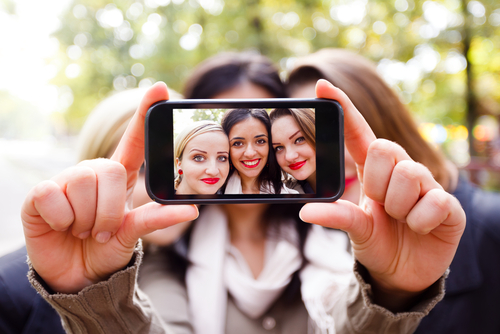
A “Selfie” is a self-portrait photo. Selfies aren’t new. People have been turning around their camera to try and get a good picture of themselves for years. Photographers have set the camera and run with a timer to try and get a good portrait of themselves. Today, selfie-taking has a completely commoditized culture attached to it. There are selfie sticks- long poles which attach to the phone and offer a better view for selfie-taking, light box phone cases which better illuminate the face for a selfie, and a whole range of products which enhance the ability for someone to take better pictures of themselves. When phones had cameras put on them and the cameras started to allow viewers to take the picture, the culture took off. Then, in a groundbreaking move, phones developed two cameras, one on the front and one on the back, so selfie-takers could really see themselves taking the picture and getting the perfect shot.
Selfie-taking has gained a lot of criticism for ties to narcissism. While some studies have indicated that the self-taking culture is nothing but narcissistic, other studies have found that there are only loose ties to narcissism in specific populations. Three kinds of people take selfies, according to a study published in Visual Communication Quarterly. Specifically, people take selfies for three different reasons. Only one category of people have anything to do with narcissism, and they aren’t clinically diagnosed with narcissism either. The study, led by Brigham Young University found that people take selfies either as communicators, autobiographers, or self-publicists. The communicative selfie takers use selfies to communicate with friends and family or any followers on their social media platforms. It’s a form of storytelling to document part of their life. Rather than be invested in the self, they are invested in sharing their experience of the world with others, but not because they think the way that they experience the world i any better than others. Those who are in the autobiography business of selfie taking do so in order to preserve memories and remind themselves of important moments and memories in their life. The final category of those who are self-publicizing might have some ties to narcissism. Social media of all kinds gets criticized for being a place where people aren’t authentic but curate their lives instead. Rather than show their real lives they show a highly curated life where everything is as perfect as it could seem. These people want you to think they are as amazing and practically perfect as their photos show them and their lives to be. According to the research, this is the smallest category, meaning most people don’t have narcissistic tendencies in their selfie-taking.
Narcissistic personality disorder can become a debilitating issue in life complicating relationships and often leading to substance abuse. If you or a loved one might be struggling with untreated narcissism, there is help. Avalon By The Sea is a trusted provider of primary mental health care in a serene residential setting located on the iconic cliffsides of the California coast. For a confidential assessment and more information, call us today: 888-958-7511










